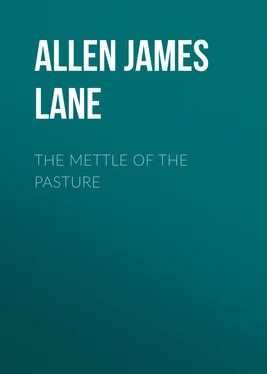James Allen - The Mettle of the Pasture
Здесь есть возможность читать онлайн «James Allen - The Mettle of the Pasture» — ознакомительный отрывок электронной книги совершенно бесплатно, а после прочтения отрывка купить полную версию. В некоторых случаях можно слушать аудио, скачать через торрент в формате fb2 и присутствует краткое содержание. Жанр: foreign_prose, foreign_antique, на английском языке. Описание произведения, (предисловие) а так же отзывы посетителей доступны на портале библиотеки ЛибКат.
- Название:The Mettle of the Pasture
- Автор:
- Жанр:
- Год:неизвестен
- ISBN:нет данных
- Рейтинг книги:4 / 5. Голосов: 1
-
Избранное:Добавить в избранное
- Отзывы:
-
Ваша оценка:
- 80
- 1
- 2
- 3
- 4
- 5
The Mettle of the Pasture: краткое содержание, описание и аннотация
Предлагаем к чтению аннотацию, описание, краткое содержание или предисловие (зависит от того, что написал сам автор книги «The Mettle of the Pasture»). Если вы не нашли необходимую информацию о книге — напишите в комментариях, мы постараемся отыскать её.
The Mettle of the Pasture — читать онлайн ознакомительный отрывок
Ниже представлен текст книги, разбитый по страницам. Система сохранения места последней прочитанной страницы, позволяет с удобством читать онлайн бесплатно книгу «The Mettle of the Pasture», без необходимости каждый раз заново искать на чём Вы остановились. Поставьте закладку, и сможете в любой момент перейти на страницу, на которой закончили чтение.
Интервал:
Закладка:
"You must," she said. "You shall tell me!" and if there was anger in her voice, if there was anguish in it, there was the authority likewise of holy and sovereign rights. But he thrust her all but rudely away, and going to the lower end of the pavement, walked there backward and forward with his hat pulled low over his eyes—walked slowly, always more slowly. Twice he laid his hand on the gate as though he would have passed out. At last he stopped and looked back to where she waited in the light, her face set immovably, commandingly, toward him. Then he came back and stood before her.
The moon, now sinking low, shone full on his face, pale, sad, very quiet; and into his eyes, mournful as she had never known any eyes to be. He had taken off his hat and held it in his hand, and a light wind blew his thick hair about his forehead and temples. She, looking at him with senses preternaturally aroused, afterwards remembered all this.
Before he began to speak he saw rush over her face a look of final entreaty that he would not strike her too cruel a blow. This, when he had ceased speaking, was succeeded by the expression of one who has received a shock beyond all imagination. Thus they stood looking into each other's eyes; then she shrank back and started toward the house.
He sprang after her.
"You are leaving me!" he cried horribly.
She walked straight on, neither quickening nor slackening her pace nor swerving, although his body began unsteadily to intercept hers.
He kept beside her.
"Don't! Isabel!" he prayed out of his agony. "Don't leave me like this—!"
She walked on and reached the steps of the veranda. Crying out in his longing he threw his arms around her and held her close.
"You must not! You shall not! Do you know what you are doing, Isabel?"
She made not the least reply, not the least effort to extricate herself. But she closed her eyes and shuddered and twisted her body away from him as a bird of the air bends its neck and head as far as possible from a repulsive captor; and like the heart of such a bird, he could feel the throbbing of her heart.
Her mute submission to his violence stung him: he let her go. She spread out her arms as though in a rising flight of her nature and the shawl, tossed backward from her shoulders, fell to the ground: it was as if she cast off the garment he had touched. Then she went quickly up the steps. Before she could reach the door he confronted her again; he pressed his back against it. She stretched out her hand and rang the bell. He stepped aside very quickly—proudly. She entered, closing and locking noiselessly the door that no sound might reach the servant she had summoned. As she did so she heard him try the knob and call to her in an undertone of last reproach and last entreaty:
" Isabel!—Isabel!—Isabel !"
Hurrying through the hall, she ran silently up the stairs to her room and shut herself in.
Her first feeling was joy that she was there safe from him and from every one else for the night. Her instant need was to be alone. It was this feeling also that caused her to go on tiptoe around the room and draw down the blinds, as though the glimmering windows were large eyes peering at her with intrusive wounding stare. Then taking her position close to a front window, she listened. He was walking slowly backward and forward on the pavement reluctantly, doubtfully; finally he passed through the gate. As it clanged heavily behind him, Isabel pressed her hands convulsively to her heart as though it also had gates which had closed, never to reopen.
Then she lighted the gas-jets beside the bureau and when she caught sight of herself the thought came how unchanged she looked. She stood there, just as she had stood before going down to supper, nowhere a sign of all the deep displacement and destruction that had gone on within.
But she said to herself that what he had told her would reveal itself in time. It would lie in the first furrows deepening down her cheeks; it would be the earliest frost of years upon her hair.
A long while she sat on the edge of the couch in the middle of the room under the brilliant gaslight, her hands forgotten in her lap, her brows arched high, her eyes on the floor. Then her head beginning to ache, a new sensation for her, she thought she should bind a wet handkerchief to it as she had often done for her aunt; but the water which the maid had placed in the room had become warm. She must go down to the ewer in the hall. As she did so, she recollected her shawl.
It was lying on the wet grass where it had fallen. There was a half-framed accusing thought that he might have gone for it; but she put the thought away; the time had passed for courtesies from him. When she stooped for the shawl, an owl flew viciously at her, snapping its bill close to her face and stirring the air with its wings. Unnerved, she ran back into the porch, but stopped there ashamed and looking kindly toward the tree in which it made its home.
An old vine of darkest green had wreathed itself about the pillars of the veranda on that side; and it was at a frame-like opening in the massive foliage of this that the upper part of her pure white figure now stood revealed in the last low, silvery, mystical light. The sinking of the moon was like a great death on the horizon, leaving the pall of darkness, the void of infinite loss.
She hung upon this far spectacle of nature with sad intensity, figuring from it some counterpart of the tragedy taking place within her own mind.
II
Isabel slept soundly, the regular habit of healthy years being too firmly entrenched to give way at once. Meanwhile deep changes were wrought out in her.
When we fall asleep, we do not lay aside the thoughts of the day, as the hand its physical work; nor upon awakening return to the activity of these as it to the renewal of its toil, finding them undisturbed. Our most piercing insight yields no deeper conception of life than that of perpetual building and unbuilding; and during what we call our rest, it is often most active in executing its inscrutable will. All along the dark chimneys of the brain, clinging like myriads of swallows deep-buried and slumbrous in quiet and in soot, are the countless thoughts which lately winged the wide heaven of conscious day. Alike through dreaming and through dreamless hours Life moves among these, handling and considering each of the unredeemable multitude; and when morning light strikes the dark chimneys again and they rush forth, some that entered young have matured; some of the old have become infirm; many of which have dropped in singly issue as companies; and young broods flutter forth, unaccountable nestlings of a night, which were not in yesterday's blue at all. Then there are the missing—those that went in with the rest at nightfall but were struck from the walls forever. So all are altered, for while we have slept we have still been subject to that on-moving energy of the world which incessantly renews us yet transmutes us—double mystery of our permanence and our change.
It was thus that nature dealt with Isabel on this night: hours of swift difficult transition from her former life to that upon which she was now to enter. She fell asleep overwhelmed amid the ruins of the old; she awoke already engaged with the duties of the new. At sundown she was a girl who had never confessed her love; at sunrise she was a woman who had discarded the man she had just accepted. Rising at once and dressing with despatch, she entered upon preparations for completing her spiritual separation from Rowan in every material way.
The books he had lent her—these she made ready to return this morning. Other things, also, trifles in themselves but until now so freighted with significance. Then his letters and notes, how many, how many they were! Thus ever about her rooms she moved on this mournful occupation until the last thing had been disposed of as either to be sent back or to be destroyed.
Читать дальшеИнтервал:
Закладка:
Похожие книги на «The Mettle of the Pasture»
Представляем Вашему вниманию похожие книги на «The Mettle of the Pasture» списком для выбора. Мы отобрали схожую по названию и смыслу литературу в надежде предоставить читателям больше вариантов отыскать новые, интересные, ещё непрочитанные произведения.
Обсуждение, отзывы о книге «The Mettle of the Pasture» и просто собственные мнения читателей. Оставьте ваши комментарии, напишите, что Вы думаете о произведении, его смысле или главных героях. Укажите что конкретно понравилось, а что нет, и почему Вы так считаете.












